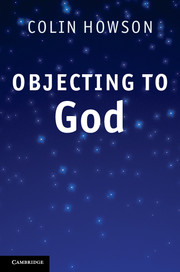Book contents
- Frontmatter
- Contents
- Preface
- Acknowledgments
- Chapter 1 Of human bondage
- Chapter 2 God unlimited
- Chapter 3 How to reason if you must
- Chapter 4 The well-tempered universe
- Chapter 5 What does it all mean?
- Chapter 6 Moral equilibrium
- Chapter 7 What is life without Thee?
- Chapter 8 It necessarily ain't so
- Bibliography
- Index
- References
Chapter 5 - What does it all mean?
Published online by Cambridge University Press: 05 June 2012
- Frontmatter
- Contents
- Preface
- Acknowledgments
- Chapter 1 Of human bondage
- Chapter 2 God unlimited
- Chapter 3 How to reason if you must
- Chapter 4 The well-tempered universe
- Chapter 5 What does it all mean?
- Chapter 6 Moral equilibrium
- Chapter 7 What is life without Thee?
- Chapter 8 It necessarily ain't so
- Bibliography
- Index
- References
Summary
‘There’s a reason for everything.’
From here to infinity
We have probably all heard of feedback cycles, where a permissible operation can send a system into an unending sequence of cycles. Something rather like one haunts the philosophical literature on God. Its origin is the apparently unremarkable fact that every natural language contains a word or words equivalent to ‘Why?’ The fact may seem unremarkable, but combined with what looks like an equally unremarkable assumption it generates an explosive mixture. For if X is any meaningful contingent statement, the expression ‘Why (is it the case that) X?’ is a grammatically well-formed question, and given the plausible assumption that to any meaningful question there is in principle an answer, we have the loop: to any answer, say Z, you simply stick ‘Why’ in front of it and place ‘?’ after it, and off you go again. Forever, or so it seems.
Information
- Type
- Chapter
- Information
- Objecting to God , pp. 114 - 135Publisher: Cambridge University PressPrint publication year: 2011
